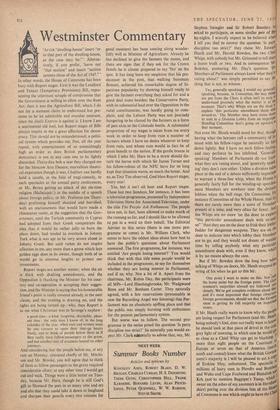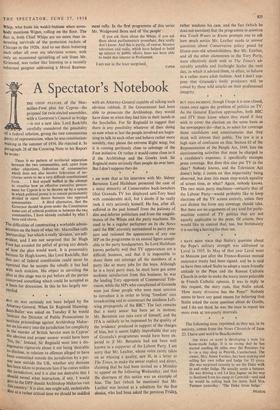Westminster Commentary
'AFTER "dwelling-house" insert "or to that part of the dwelling-house, as the case may be."' Alterna- ._ tively, if you prefer, 'leave out "that section" and insert "section seventy-three of the Act of 1947."' In other words, the House of Commons has been busy with Report stages. First it was the Landlord and Tenant (Temporary Provisions) Bill, repre- senting the uttermost scruple of compromise that the Government is willing to allow over the Rent Act; then it was the Agriculture Bill, which I do not for a moment claim to understand but pre- sume to be an admirable and overdue measure, since the Daily Express is against it. I know I am a sentimental old fool, but Report stages of Bills always inspire in me a great affection for demo- cracy. This should not be misunderstood; a politi- cal system which provides me, free, all the year round, with entertainment of so astonishingly high an order as does British parliamentary democracy is not in any case one to be lightly discarded. Thirty-five bob a seat they charged me for the Moscow Arts Theatre; marvellous theatri- cal experience though it was, Chekhov can hardly hold a candle, in the field of tragi-comedy, to such spectacles as the annual party conferences, or Mr. Bevan getting an attack of dat ole-time religion (Hallelujah!) in the middle of a speech about foreign policy, or Mr. Profumo (on Thurs- day) professing himself shocked and horrified, with an unctuousness that would have made a rhinoceros vomit, at the suggestion that the Gov- ernment, until the Turkish community in Cyprus had adopted from their Greek compatriots the idea that it would be rather jolly to burn the place down, had tended to overlook in Johnny Turk what it was apt to be very severe about in Johnny Greek. But such riches do not inspire affection in me, any more than a goose which lays golden eggs does in its owner, though both of us would go to extreme lengths to protect our investments.
Report stages are another matter; when the air is thick with drafting amendments, and the Opposition is thanking the Minister for his cour- tesy and co-operation in accepting their sugges- tion, and the Minister is saying that his honourable friend's point is really covered already in the next clause, and the evening is drawing on, and the lights are being turned up—why, then Report is to me what Christmas was to Scrooge's nephew : a good time: a kind, forgiving, charitable, pleas- ant time : the only time I know of, in the long calendar of the year, when men and women seem by one consent to open their shut-up hearts freely, and to think of people below them as if they really were fellow-passengers to the grave, and not another race of creatures bound on other journeys.
A'nd considering that the people below me, at any rate on Monday, consisted chiefly of Mr. Mitchi- son and Mr. Brooke, you will agree that to think of them as fellow-passengers to the grave required considerable effort; at any other time I would get out and walk. Things were a little better on Tues- day, because Mr. Hare, though he is still God's gift to Hansard (he puts in so many urns and ers and ahs that they could take it down in longhand and sharpen their pencils every two minutes for good measure) has been coming along wonder- fully well as Minister of Agriculture. Already he has declined to give the farmers the moon, and there are signs that if they ask for the Crown Rwels he is almost prepared to say 'No' on the spot. It has long been my suspicion that his pre- decessor in the post, that walking Summum Bonum, achieved his remarkable degree of bi- partisan popularity by showing himself ready to give the farmers everything they asked for and a good deal more besides; the Conservative Party, with its substantial lead over the Opposition in the rural constituencies, was hardly going to com- plain, and the Labour Party was not precisely hungering to be classed by the farmers as a form of pest akin to the Colorado beetle. A substantial proportion of my wages is taken from me every week in order to keep from ruin a number of farmers whom I.have no desire whatever to keep from ruin, and whose ruin would in fact be of great benefit to the nation. If the gentle breeze in which I take Mr. Hare to be a straw should dis- turb the leaves with which Sir James Turner and his fellow-robins of the NFU have for so long kept that situation warm, so much the better. And so, as Tiny Tim observed, God bless Report stages, every one!
Yes, but it isn't all beer and Report stages. These last two Sundays, for instance, it has been a television programme, presented by Independent Television News for Associated-Television, under the title The People Ask Parliament. The people have not, in fact, been allowed to make much of the running so far, and I should like to be allowed to put in a word on their behalf. The Editorial Adviser to this series (there is one more pro- gramme to come) is Mr. William Clark, who seems to have the oddest ideas about how best to have the public's questions about Parliament answered. The first programme, for instance, was entitled 'Are people losing interest?' You would think that with that title some people would be included in the programme, to say for themselves whether they are losing interest in Parliament, and if so, why. Not a bit of it. Apart from the chairman, Mr. Robin Day, the participants were all MPs—Lord Hinchingbrooke, Mr. Wedgwood Benn and Mr. Bonham Carter. They naturally agreed, with a few reservations (presumably in case the Recording Angel was listening) that Par- liament was an absolutely spiffing place and that the public was simply bursting with enthusiasm for the present parliamentary system.
But worse was to follow. The second pro- gramme in the series posed the question 'Is party discipline too strict?' So naturally you would ex- pect Mr. Clark editorially to advise that, say, Mr. THE SPECTATOR, JUNE 27, l95 Stephen Swingler and Sir Robert Boothby be asked to participate, or some similar pair of fly' by-nights. I scarcely expect to be believed when 1 tell you that to answer the question 'Is party discipline too strict?' they chose Mr. Edward Heath and Mr. Harold Bowden, the two Chief Whips, with nobody but Mr. Grimond to tell thent a home truth or two. And in consequence Bowden, answering Mr. Day's question 'D° Members of Parliament always know what they're voting about?' was simply permitted to say the thing that is not, as witness: Yes, generally speaking. I would say generally speaking, because, in Committee, the way things are put from the Chair it often isn't so easy t0 understand precisely what the matter is at the moment. That's why Whips are on the door t° explain 'this particular amendment deals with so-and-so.' The Member may have come dowel to vote in a Division Lobby from an important Standing Coinmittee that's going on upstairs st that moment.
Not even Mr. Heath would stand for that, though having what the lawyers call a community of terest with his fellow-rogue he naturally let hills down lightly. But I have no such fellow-feeling, and may perforce be less inhibited. `GenerallY speaking' Members of Parliament do not knoll what they are voting about, and 'generally spellic' ing' they don't care either. Unless a division talon place at the end of a debate sufficiently important to warrant a three-line whip, when the House is generally fairly full for the winding-up speeches, most Members are nowhere near the division lobbies when the bell. rings. On Committee, Ng instance (Committee of the Whole House, that is)' there are rarely more than a score of Members present at a time, and very often far fewer. And the Whips are no more 'on the door to explain "this particular amendment deals with so-and' so" ' than they are on the door to frisk their lobby' fodder for dangerous weapons. They are on the door to indicate into which lobby their Members are to go, and they would not dream of wasting time by telling anybody what any particular amendment deals with, even if they know, which is by no means always the case. But if Mr. Bowden drew the long bow when talking of Whips on doors, Mr. Heath snapped the string of his when he got to this bit: One point I want to make on this. Not '001 the home point but the foreign point. The Got' ernment's majorities abroad are followed Wu, closely. We've got complete evidence about tht" and it's most important that foreign observe."' foreign governments, should see that the Govern' ment is getting its full majority on impor issues. If Mr. Heath really wants to know why the people are losing respect for Parliament (and Mr. Head' being nobody's fool, does not really want to knot, he should look at that piece of drivel in the cow grey light of morning, in which case he would gel as close as a Chief Whip can get to blushing f more than eight people on the Continent Europe or seven on that of America south and central) know what the British Goveerr menu's majority is I will be pleased to eat a cop, i of Erskine May, unbuttered. The spectacle millions of hairy men in Plovdiv and BultiSsil and Wuhu and Cape Foulwind and Binhdinh h Krk (not to mention Bagpiper's 'rump, w—C swear on the ashes of my ancestors is in Hereford shire) poring over the division lists of the 11011911.ei of Commons is one which ought to have the Cbg Whip, who busts his weskit-buttons when some- body mentions Wigan, rolling on the floor. The fact is, both Chief Whips are no more than in- teresting survivals of the protection rackets of Chicago in the 1920s. And to see them buttering each other all over my television screen, with only an occasional sprinkling of salt from Mr. Grimond, was rather like listening to a recently reformed gangster addressing a Moral Rearma- ment rally. In the first programme of this series Mr. Wedgwood Benn said of 'the people':
If you ask them about the Whips, if you ask them about parliamentary procedure, they really don't know. And this is partly, of course, because television and radio, which have helped to build up interest in public affairs, have not been able to build that interest in Parliament.
I am not in the least surprised. TAPER I am not in the least surprised. TAPER



































 Previous page
Previous page